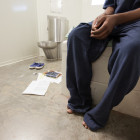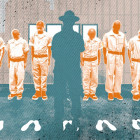
Baltimore’s Newly Approved Youth Curfew among Strictest in Nation
|
To its detractors, the curfew represents “virtual house arrest.”
Juvenile Justice Information Exchange (https://jjie.org/author/ggately/page/7/)

To its detractors, the curfew represents “virtual house arrest.”

If brain development continues until about age 25 why does the U.S. criminal justice system continue to treat these young people as if they’re fully developed adults?

“In a word, I would say the state of the initiative is ‘robust.’ It is big and still growing."

Amid growing outcry over solitary confinement of juveniles, the Baltimore-based Annie E. Casey Foundation is calling for an end to the practice except as a short-term response to behavior that threatens a youth or others.

Author Nell Bernstein on the horrors of juvenile prison documented in her new book.

U.S. Attorney General Eric H. Holder Jr. condemned “excessive” use of solitary confinement of children with mental illness in juvenile facilities.

“Kids are kids, and kids should not be in the adult system,” Carmen Daugherty, CFYJ’s policy director, told JJIE.

A truancy court program in Baltimore keeps kids out of the school-to-prison pipeline.

The hardliner prosecutor teaching a law course in a women’s maximum-security prison in Tennessee got to know inmates as real people rather than just paperwork. It changed his life so much he quit his job as a prosecutor, saying he could no longer be complicit in a system that warehoused for decades people who committed crimes as teenagers. The woman who managed an art gallery in a small Pennsylvania town always considered herself a big believer in law and order — and couldn’t imagine befriending a man serving life without parole on a first-degree murder conviction. Then somebody brought some of the inmate’s artwork to her gallery, and she contacted him. Today, she calls him a son, and he calls her “Mom.”
The former Chicago gang member convicted of first-degree murder for his involvement in a fatal stabbing and beating that took place when he was 13 now has a master’s degree, has counseled countless troubled kids and is a youth justice advocate fighting extreme sentencing of juveniles.

Nate Balis acknowledges he has big shoes to fill. After all, he’s succeeding Bart Lubow as director of the Juvenile Justice Strategies Group at the Annie E. Casey Foundation. Lubow designed and managed the Juvenile Detention Alternatives Initiative (JDAI), which began in 1992, and he is something of a legend in juvenile justice circles. JDAI is the nation’s most widely replicated juvenile reform effort, now operating at more than 250 sites in 39 states and the District of Columbia. “Bart is one of my mentors; he’s one of my heroes in the field,” Balis told JJIE.